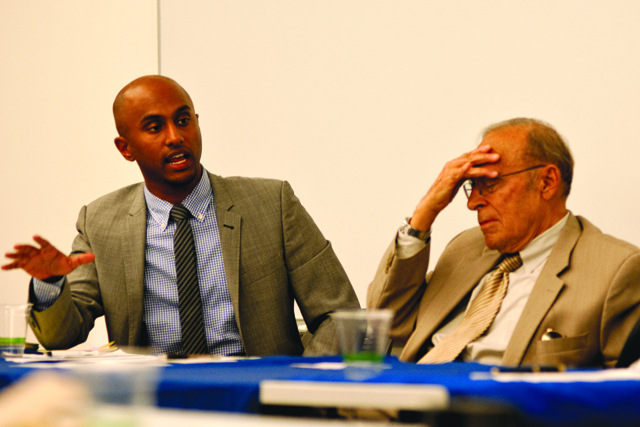Panelists challenged each other’s views on the role race plays in university admissions Wednesday afternoon.
“No one was prepared for that,” Courtney Weaver, a public affairs and social work graduate student, said after the forum.
Weaver said the level of frustration conveyed by the panelists added an honest and open element to the forum.
The Public Affairs Alliance for Communities of Color hosted the forum discussing how the Supreme Court decision on Fisher v. University of Texas will affect affirmative action in the United States. The panel included three professors and an attorney. UT admits close to three-fourths of its incoming students automatically based on high school class rank and the remaining capacity is filled by students that are chosen based on factors such as academic achievement, personal achievement and special circumstances. The special circumstances factor is comprised of eight categories; one of these is race and ethnicity.
Fisher v. University of Texas is a lawsuit filed in 2008 by two white students who were denied admission. The case challenges the constitutionality of affirmative action — giving admissions preference to minorities. On Wednesday the Supreme Court will hear the Fisher case.
Thomas Mariadason, an attorney for the Asian American Legal Defense and Education Fund, filed a formal statement in support of UT. He said holistic review is nothing new in higher education.
The Top 10 Percent rule has never determined who will become a successful student or professional, Mariadason argued. He said losing the ability to do a review with race as a factor of each candidate will lead to a loss in intellectual diversity in the student population.
UT law professor Lino Graglia said students should be admitted based on test scores. Graglia said admitting students who do not test at a level that competes with university standards is a disservice to the student.
“Blacks, like everyone else, do better in terms of grades, graduation, admission to graduate school in schools [for] which they are fully qualified,” said Graglia.
Public affairs professor Edwin Dorn said minority students are represented on campus without aid from affirmative action.
“The percentage of African-Americans and Hispanics that come into the University of Texas under the Top 10 Percent rule is higher than the percentage of African-Americans and Hispanics that are admitted under this sort of generic thing that we call affirmative action,“ Dorn said.
Dorn said the issues with affirmative action are rooted in white privilege. He said instead of retreating from racial problems we should face the struggles.
Leonard Moore, vice president for UT’s Division of Diversity and Community Engagement, said in “UGS 303:Race in the Age of Obama” that he has an ethnic variety of students who have an assortment of ideologies. Moore said they leave the classroom with a better understanding of the issues they discuss because of the differing points of view.





















